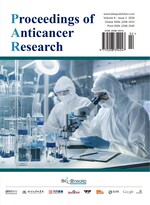Abstract
Objective: To investigate the effect of TSH inhibition therapy in the postoperative management of patients with differentiated thyroid cancer. Methods: Seventy patients diagnosed with differentiated thyroid cancer were selected for the study. TSH inhibition therapy was administered to the research group, while thyroxine replacement therapy was provided to the control group during the postoperative management phase. This allowed for a comparative analysis between the two groups. Results: In comparison with the control group, the research group exhibited significant decreases in serum TSH, T3, and T4 levels after treatment, while FT4 and FT3 levels significantly increased (P < 0.05). Additionally, significant decreases in Tg, VEGF, TSGF, CD44V6, and sIL-2R levels were observed in the research group after treatment (P < 0.05). No significant differences were found in pre-treatment thyroid function between the two groups (P > 0.05). Conclusion: The application of TSH inhibition therapy in the postoperative management of patients with differentiated thyroid cancer demonstrates promising outcomes.
References
Wang X, Zhao F, Yan S, 2022, Effects of Thyrotropin Suppression Therapy on Bone Metabolism, CD44V6 and sIL-2R Levels in Patients with Differentiated Thyroid Cancer. Chinese Journal of Modern Medicine, 32(23): 34–38.
Zhang X, Chen D, 2023, Research Progress on Osteoporosis Caused by Thyrotropin Suppression Therapy After Surgery for Differentiated Thyroid Cancer. Primary Chinese Medicine, 2(2): 108–113.
Bai N, Liu C, Zhang X, et al., 2021, Application of TSH Inhibition Therapy in Differentiated Thyroid Cancer Patients After Surgery. Journal of Qiqihar Medical College, 42(24): 2145–2148.
Wang X, Zhao Y, 2021, Study on the Effect of Thyrotropin Suppression Regimen on Prognosis and T-Cell Immune Factors in Elderly Thyroid Cancer Patients. Chinese Journal of Practical Internal Medicine, 41(11): 978–980.
Mei Y, Wang Q, Zhao L, et al., 2021, Effect of TSH Inhibition Therapy on Immune Function and Bone Metabolism in Postoperative Patients with Differentiated Thyroid Cancer. Chongqing Medicine, 50(8): 1381–1384.
Wu W, Jing J, Gao J, et al., 2022, Effects of Thyrotropin Suppression Therapy on TRAb, TPOAb, and TgAb in Postoperative Patients with Differentiated Thyroid Cancer. Chinese Journal of Gerontology, 42(6): 1340–1342.
Cheng R, 2023, Current Status and Thoughts on Postoperative Thyrotropin Suppression Therapy for Differentiated Thyroid Cancer. Chinese Journal of Practical Surgery, 43(4): 391–396.
Zhang R, Guan Y, 2022, Analysis of the Application Effect of Thyrotropin Suppression Therapy after Total Thyroidectomy. Chinese and Foreign Medicine Research, 20(28): 111–115.
Kong X, Liu Q, Xu W, et al., 2021, Effects of Different TSH Inhibitory Treatments on TSH, FT3, and FT4 in Differentiated Thyroid Cancer After Surgery. China Medical Innovation, 18(7): 155–158.
Ding Y, Jiang L, Zhang Z, 2022, Correlation Analysis of TSH and Tg Levels and Long-Term Prognosis in Patients with Differentiated Thyroid Cancer After 131I Treatment. Health Research, 42(2): 227–230 + 233.
Lin Y, 2022, Controversy and Exploration of 131I Therapy for Differentiated Thyroid Cancer. International Journal of Radiation Medicine and Nuclear Medicine, 46(7): 389–391.
Zhang L-D, Xi Y-C, You L-Q, et al., 2018, Effect of TSH Inhibition Therapy on Serum Tg, VEGF, TSGF, CD44V6, sIL-2R, and T Lymphocyte Subpopulation Levels in Patients with Differentiated Thyroid Cancer After Surgery. Journal of Hainan Medical College, 24(2): 242–245.
Wu W, Jing J, Gao J, et al., 2022, Effects of Thyrotropin Suppression Therapy on TRAb, TPOAb, and TgAb in Postoperative Patients with Differentiated Thyroid Cancer. Chinese Journal of Gerontology, 42(6): 1340–1342.
Jin W, Yao X, 2022, Exploring the Efficacy of Thyroid-Stimulating Hormone (TSH) Suppression Therapy in Postoperative Thyroid Cancer Patients. China Medical Digest: Otolaryngology, 37(1): 97–99.
Zhao F-L, Kang Y-L, Ma Y-J, et al., 2021, Efficacy of TSH Inhibition Therapy in Elderly Thyroid Cancer Patients After Total Thyroidectomy and Its Effect on Serum Tg, TSH, and CEA Levels. Journal of Practical Cancer, 2021(12): 36.
